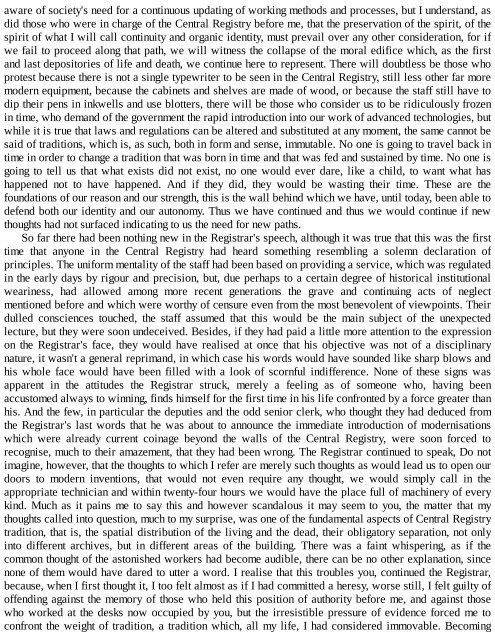You also want an ePaper? Increase the reach of your titles
YUMPU automatically turns print PDFs into web optimized ePapers that Google loves.
aware of society's need for a continuous updating of working methods and processes, but I understand, as<br />
did those who were in charge of the Central Registry before me, that the preservation of the spirit, of the<br />
spirit of what I will call continuity and organic identity, must prevail over any other consideration, for if<br />
we fail to proceed along that path, we will witness the collapse of the moral edifice which, as the first<br />
and last depositories of life and death, we continue here to represent. <strong>The</strong>re will doubtless be those who<br />
protest because there is not a single typewriter to be seen in the Central Registry, still less other far more<br />
modern equipment, because the cabinets and shelves are made of wood, or because the staff still have to<br />
dip their pens in inkwells and use blotters, there will be those who consider us to be ridiculously frozen<br />
in time, who demand of the government the rapid introduction into our work of advanced technologies, but<br />
while it is true that laws and regulations can be altered and substituted at any moment, the same cannot be<br />
said of traditions, which is, as such, both in form and sense, immutable. No one is going to travel back in<br />
time in order to change a tradition that was born in time and that was fed and sustained by time. No one is<br />
going to tell us that what exists did not exist, no one would ever dare, like a child, to want what has<br />
happened not to have happened. And if they did, they would be wasting their time. <strong>The</strong>se are the<br />
foundations of our reason and our strength, this is the wall behind which we have, until today, been able to<br />
defend both our identity and our autonomy. Thus we have continued and thus we would continue if new<br />
thoughts had not surfaced indicating to us the need for new paths.<br />
So far there had been nothing new in the Registrar's speech, although it was true that this was the first<br />
time that anyone in the Central Registry had heard something resembling a solemn declaration of<br />
principles. <strong>The</strong> uniform mentality of the staff had been based on providing a service, which was regulated<br />
in the early days by rigour and precision, but, due perhaps to a certain degree of historical institutional<br />
weariness, had allowed among more recent generations the grave and continuing acts of neglect<br />
mentioned before and which were worthy of censure even from the most benevolent of viewpoints. <strong>The</strong>ir<br />
dulled consciences touched, the staff assumed that this would be the main subject of the unexpected<br />
lecture, but they were soon undeceived. Besides, if they had paid a little more attention to the expression<br />
on the Registrar's face, they would have realised at once that his objective was not of a disciplinary<br />
nature, it wasn't a general reprimand, in which case his words would have sounded like sharp blows and<br />
his whole face would have been filled with a look of scornful indifference. None of these signs was<br />
apparent in the attitudes the Registrar struck, merely a feeling as of someone who, having been<br />
accustomed always to winning, finds himself for the first time in his life confronted by a force greater than<br />
his. And the few, in particular the deputies and the odd senior clerk, who thought they had deduced from<br />
the Registrar's last words that he was about to announce the immediate introduction of modernisations<br />
which were already current coinage beyond the walls of the Central Registry, were soon forced to<br />
recognise, much to their amazement, that they had been wrong. <strong>The</strong> Registrar continued to speak, Do not<br />
imagine, however, that the thoughts to which I refer are merely such thoughts as would lead us to open our<br />
doors to modern inventions, that would not even require any thought, we would simply call in the<br />
appropriate technician and within twenty-four hours we would have the place full of machinery of every<br />
kind. Much as it pains me to say this and however scandalous it may seem to you, the matter that my<br />
thoughts called into question, much to my surprise, was one of the fundamental aspects of Central Registry<br />
tradition, that is, the spatial distribution of the living and the dead, their obligatory separation, not only<br />
into different archives, but in different areas of the building. <strong>The</strong>re was a faint whispering, as if the<br />
common thought of the astonished workers had become audible, there can be no other explanation, since<br />
none of them would have dared to utter a word. I realise that this troubles you, continued the Registrar,<br />
because, when I first thought it, I too felt almost as if I had committed a heresy, worse still, I felt guilty of<br />
offending against the memory of those who held this position of authority before me, and against those<br />
who worked at the desks now occupied by you, but the irresistible pressure of evidence forced me to<br />
confront the weight of tradition, a tradition which, all my life, I had considered immovable. Becoming



